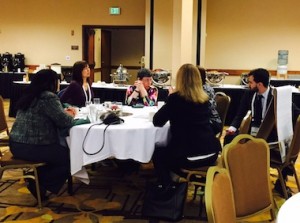 We recently surveyed thousands of college students and hundreds of faculty to see what they thought about the state of information literacy skills in higher ed. Following the release of our extensive survey findings, we had the pleasure of hosting a lively and well-attended breakfast discussion. It was too good to keep to ourselves, so we’ve put together this series of blog posts to include you in the conversation!
We recently surveyed thousands of college students and hundreds of faculty to see what they thought about the state of information literacy skills in higher ed. Following the release of our extensive survey findings, we had the pleasure of hosting a lively and well-attended breakfast discussion. It was too good to keep to ourselves, so we’ve put together this series of blog posts to include you in the conversation!
What kind of obstacles do librarians face when attempting to collaborate with faculty, and how can these be addressed?
Whether it’s a matter of faculty not be willing or able to share course time, or afraid of admitting they’re less knowledgeable about a topic than some of their peers, there are plenty of reasons people find for not being able to work together. Librarians we spoke to recommended:
- Understand each faculty member’s goals for their class. Are they looking for students to master foundational information; are they hoping for original research; critical thinking or problem-solving?
- Tailor your proposal accordingly. Faculty are more likely to respond when they see you focusing on their specific needs and not trying to wedge yourself into their class promoting your own agenda.
- Pounce on newbies early. Reach out to grad students who have recently taken on TA duties.
- Get out there: Go door to door, show up at office hours, approach faculty during the summer when they’re less busy. Reach out early and often!
Should librarians increase outreach directly to students, or focus on building relationships with faculty and what would those types of outreach look like?
Over half of the students we surveyed reported going to their professor first with research questions, underscoring the influence faculty have over student research behaviors. . Most librarians we spoke with agreed that libraries should continue reaching out to both faculty and students, but added that libraries themselves need to change the way they market this information if they want students and faculty to buy in. Basically, students don’t get excited about research skills because they don’t understand their own deficiencies when it comes to research.
- Position research skills as a “life hack” to supplement their skills and make their lives easier, rather than lecturing about the virtues of proper research.
- Show don’t tell. Faculty members might underestimate what librarians can do until they see them in action. One group recommended creating a handout with relevant resources and databases for a specific class/department and sending it out to all takers, no strings attached.
We look forward to keeping this discussion alive in the comments section here, or on Twitter, hashtag #CredoChat. And stay tuned for more posts in this series!
